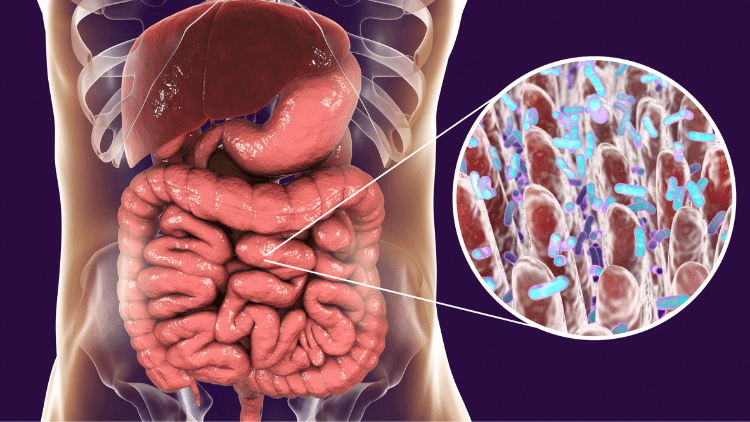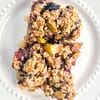Share This

Pages on this site may contain affiliate links, meaning if you book or buy something, I may earn an affiliate commission at no additional cost to you. Thank you for your support! Learn More
Also note: While I am a certified nutrition coach, I am not a medical doctor. Information here is not intended to be a replacement for the advice you should seek from your doctor.
Leaky gut… a term that’s been buzzing around socials a lot lately. But what exactly is leaky gut syndrome, and what are the best ways to heal it naturally? And how to know if you are suffering from it? In this article, you will learn everything you need to know about this insidious condition, starting from its main causes and symptoms, and ending with a comprehensive leaky gut diet plan that will help you treat it with the power of food and some smart lifestyle choices. In the end, some nourishing and delicious leaky gut-friendly recipes!
Please remember to consult with a registered dietitian or nutritionist to obtain personalized recommendations, especially if you have any health concerns or need more specific nutritional advice.
Understanding Leaky Gut Syndrome: Causes, Symptoms, and Diagnosis
First things first, let’s understand what a leaky gut actually is. Leaky gut, also known as increased intestinal permeability or hyperpermeability, is a condition where the lining of your intestines becomes more porous than it should be. This phenomenon occurs when the tight junctions – the gatekeepers between the cells lining the intestines – become compromised due to a host of reasons we will investigate in the next section.
In turn, these “gaps” in the intestine lining can allow undigested food particles, toxins, and bacteria to “leak” into your bloodstream. This can trigger an immune response, as the body recognizes these foreign particles as invaders, leading to inflammation and a range of health issues, from digestive discomfort to immune system imbalances.


Imagine your intestinal lining as a finely woven fabric, selectively permitting nutrients and other necessary molecules to enter the bloodstream while blocking harmful substances. In leaky gut syndrome, this fabric becomes more like a sieve, allowing larger particles such as undigested food particles, toxins, and even bacteria to escape from the digestive tract and enter the bloodstream.
Having said that, it’s now time to dive into the nitty-gritty of what causes leaky gut and the telltale signs that might indicate you’re dealing with it!
What Are The Causes of Leaky Gut Syndrome?
The causes of leaky gut syndrome are diverse and often interconnected. Chronic stress, an unhealthy diet high in processed foods and sugars, excessive alcohol consumption, certain medications (like non-steroidal anti-inflammatory drugs), infections, and underlying conditions like Crohn’s disease or celiac disease can all contribute to the breakdown of the intestinal barrier.
Let’s have a closer look at each of them.
1. Unbalanced Diets, Excessive Alcohol Consumption, and Food Intolerances and/or Sensitivities
Diet plays a significant role when it comes to both causing and preventing leaky gut. Consuming a high-sugar and high-saturated fat diet, processed foods, and excessive alcohol can all contribute to gut inflammation and increased permeability. The same goes for food intolerances or sensitivities, like lactose intolerance or gluten sensitivity.
On the other hand, a diet rich in healthy fats and whole foods can actually prevent the insurgence of this insidious condition.
❤️❤️ Don’t miss a recipe or post! Make sure you remember to sign up for my Newsletter and follow me on social ❤️❤️!
Get Your Free Stuff!
2. Chronic Stress
As explained in this article about the gut-brain axis, stress isn’t just in your head. Identically, it affects your gut too. Chronic stress can weaken the gut barrier and alter the balance of gut bacteria. As a consequence, this increases the chances of suffering from gut hyperpermeability.
3. Medications
Some medications, especially non-steroidal anti-inflammatory drugs (NSAIDs), like ibuprofen and aspirin, antacids, proton pump inhibitors (PPIs), steroids, immunosuppressive medications, and antibiotics can potentially lead to thinning of the gut lining, making it more susceptible to damage and leakiness
4. Infections
Infections within the gastrointestinal tract can have a significant impact on the health and integrity of the intestinal lining. When harmful bacteria, such as Salmonella, E. coli, and Campylobacter, viruses, including rotavirus and norovirus, fungal infections like Candida overgrowth, or parasites invade the gut, they can cause inflammation and increase the permeability of the intestine mucose, potentially leading to leaky gut.
5. Pre-existing Inflammatory Conditions
Conditions like Crohn’s disease and celiac disease are associated with increased gut permeability due to chronic inflammation.
6. Environmental Toxins
Exposure to toxins, such as pesticides, heavy metals, or pollutants -that can be contained also in personal care and household cleaning products– may increase the risk of suffering from gut hyperpermeability. In particular, these toxins can alter the composition of your gut microbiome – the community of bacteria living in your intestines. A disrupted microbiome can lead to gut dysbiosis, which can in turn contribute to inflammation as well as leaky gut.
7. Genetics
Lastly, genetics can also play a role in the insurgence of leaky gut. For instance, if you have genetic markers that predispose you to heightened inflammation, your gut may be more susceptible to damage from infections, toxins, or other triggers.
10 Most Common Symptoms of Leaky Gut Syndrome
The symptoms of leaky gut syndrome can manifest throughout the body, often making it challenging to diagnose this insidious condition. Digestive discomfort such as bloating, gas, and irregular bowel movements are quite common in people suffering from increased gut permeability, as are food sensitivities and allergies that may suddenly emerge.
Similarly, the immune system can become imbalanced, leading to various symptoms like fatigue, skin issues (eczema, acne), and even joint pain. Again, an unbalanced gut microbiome can impact mood and cognitive function, potentially leading to anxiety, depression, and brain fog.


Here is a list of the 10 most common symptoms of a leaky gut.
- Digestive Distress: This includes bloating, gas, diarrhea, constipation, and general discomfort in the abdominal area.
- Food Sensitivities: Developing sensitivities to certain foods, particularly those you once tolerated without issue.
- Fatigue: A leaky gut can lead to nutrient malabsorption, which in turn can cause fatigue and a general lack of energy.
- Skin Problems: Conditions like acne, eczema, or rashes may worsen or become chronic due to inflammation triggered by a leaky gut.
- Autoimmune Issues: Likewise, some autoimmune diseases, such as rheumatoid arthritis or Hashimoto’s thyroiditis, may be exacerbated by a leaky gut.
- Mood Disorders and Cognitive Dysfunction: A leaky gut has been linked to mood disorders like anxiety and depression, likely due to the gut-brain connection. The same goes for cognitive issues like difficulty concentrating or memory problems.
- Joint Pain: Joint pain and inflammation can result from the body’s immune response to substances leaking into the bloodstream.
- Autoimmune Diseases: An increased risk of autoimmune diseases may be associated with a compromised gut lining.
- Allergies: Heightened sensitivities to environmental allergens or an increase in allergic reactions.
- Weight Changes: Difficulty losing weight or unexplained weight gain can sometimes be linked to gut issues.
Remember, the symptoms of leaky gut can vary widely from person to person, and they may overlap with other conditions. If you suspect you have a leaky gut or are experiencing persistent symptoms, it’s crucial to consult a healthcare provider/gastroenterologist.
How to Diagnose Leaky Gut Syndrome
Diagnosing leaky gut can be a bit tricky, as it’s a complex and still-evolving area of research. There’s no single definitive test for diagnosing leaky gut syndrome, and healthcare professionals often use a combination of clinical evaluation, medical history, and certain tests to assess gut health.
In case you suspect you have a leaky gut or are experiencing persistent digestive issues, you can start by scheduling an appointment with a healthcare provider, such as a gastroenterologist or a functional medicine doctor. Be prepared to discuss your symptoms in detail. Mention any digestive discomfort, food sensitivities, skin issues, autoimmune conditions, or other symptoms you’ve been experiencing. Moreover, your healthcare providers will review your medical history to identify potential factors that could contribute to a leaky gut. Examples of these are past infections, medication use, dietary habits, and lifestyle factors.
Alternatively, they can recommend an elimination diet, where you temporarily remove potential trigger foods (gluten, dairy, etc.) to see if your symptoms improve. Along the same lines, food sensitivity testing can identify specific foods that might be causing immune responses.
Furthermore, as previously explained, there’s no universally accepted test specifically for leaky gut. However certain tests may provide insights into gut health and integrity. Among these are:
- Lactulose/Mannitol Test: This involves drinking a solution containing lactulose and mannitol, two sugar molecules. The levels of these sugars in your urine can provide clues about intestinal permeability.
- Zonulin Test: Zonulin is a protein associated with gut barrier function. Elevated levels of zonulin in the blood may suggest increased intestinal permeability.
- IgG/IgA Antibody Testing: These tests measure antibodies against specific foods. Elevated levels might indicate a heightened immune response and potential gut issues.
- Stool Analysis: Comprehensive stool tests can provide insights into the gut microbiome, inflammation markers, and digestive function.
Finally, analyzing the composition of your gut microbiome can provide insights into the health of your gut. Some companies -including Viome, Ombre (Thryve), and Biohm– offer at-home kits that allow you to collect a stool sample for analysis.
Leaky Gut Diet Plan: 10 Foods to Eat (and 5 To Avoid) 🥑🌱
Even though suffering from increased gut permeability might be quite distressing both from a physical and psychological point of view, the good news is that with the right diet and lifestyle changes -and a good dose of patience and perseverance- a leaky gut can often be managed and improved.
10 Foods That Can Help Treat a Leaky Gut 🟩
Here are 10 foods that can actively help treat a leaky gut and prevent the onset of this unpleasant condition.


- Bone Broth
Sip on some soothing bone broth. It’s loaded with collagen and amino acids that can help repair your gut lining. Plus, it’s like a warm hug for your insides. - Fermented Foods
Sauerkraut, kimchi, kefir, and yogurt are packed with probiotics – the friendly bacteria your gut feeds off. They can help restore the balance in your gut microbiome. - Leafy Greens
Spinach, kale, and other leafy greens are incredibly rich in dietary fiber. Fiber acts as a prebiotic, feeding the good bacteria in your gut and promoting a healthier digestive system. - Omega-3 Rich Foods.
Salmon, chia seeds, and walnuts are high in anti-inflammatory omega-3 fatty acids. These can soothe your gut lining and help repair it from the damage caused by gut dysbiosis. - Coconut Products: Coconut oil and coconut products contain medium-chain triglycerides (MCTs). These can support gut healing by providing easily digestible energy.
- Ginger and Turmeric
These spices are like the dynamic duo of the anti-inflammatory world. They can help calm inflammation and support gut health. - Blueberries
Bursting with antioxidants, blueberries can aid in reducing oxidative stress and supporting gut repair. - Lean Proteins.
Chicken, turkey, and fish are gentler on your digestive system than heavy red meats. The same goes for protein-rich plant foods such as tofu, lentils, and chickpeas. Opt for these to give your gut a breather and help rebuild your gut lining. - Quinoa.
A protein-rich grain that’s easy on your digestive system. It also contains essential amino acids that can support gut repair. - Healthy Fats.
Avocados, olive oil, and nuts are sources of healthy fats that provide energy and support the absorption of fat-soluble vitamins.
5 Foods To Avoid If You Are Suffering From Leaky Gut Diet ❌
Simultaneously, here are 5 foods that should be avoided when suffering from extreme gut porosity.


- Processed Foods
Besides contributing to the insurgence of leaky gut, these can contain additives and chemicals that might irritate your gut and worsen inflammation. - Sugar and Artificial Sweeteners
Sugar can feed the bad bacteria in your gut, while artificial sweeteners can disrupt your gut microbiome. In both cases, the outcome might be an increase in gut permeability. - Gluten
For some, gluten can be a gut irritant, potentially leading to the disruption of its lining. Try reducing or eliminating it to see if it makes a difference for you. - Dairy
Some people have trouble digesting dairy products, which can exacerbate leaky gut symptoms. - Highly Processed Fats
Trans fats and hydrogenated oils found in many processed and fried foods can contribute to intestinal inflammation, one of the driving causes of extreme gut porosity.
7 Lifestyle and Diet Tips for a Happy Gut 🌺
Here are 10 simple and easy-to-implement tips for a healthier and happier gut, which can come in handy both for preventing and treating leaky gut syndrome.


- Mindful Eating: Chew your food thoroughly and eat slowly. This aids digestion and gives your gut time to signal your brain when you’re full.
- Stay Hydrated: Water helps maintain the mucosal lining of your intestines. Aim for at least 1.5/2 liters per day -or around 8 glasses.
- Manage Stress: Stress can wreak havoc on your gut. Incorporate stress-relieving activities like yoga, meditation, or simply taking a walk.
- Adequate Sleep: Your gut heals and regenerates while you sleep, so aim for 7-9 hours of quality sleep per night.
- Regular Exercise: Physical activity promotes healthy digestion and can reduce inflammation.
- Food Intolerances: If you suspect certain foods are causing discomfort, keep a food journal to identify patterns and discuss them with a healthcare professional.
- Probiotic Supplements: If incorporating probiotic-rich foods is a challenge, consider high-quality probiotic supplements, such as the ones from Garden of Life.
10 Incredible Leaky Gut-Friendly Recipes 🥗
In conclusion, here are 10 nourishing and mouthwatering recipes -both salty and sweet- that can support your gut health and help you treat extreme gut permeability. Of course, these are all Caitlin-approved, a.k.a. easy and quick to make, plant-focused, and complete in all the micro and macronutrients our bodies need in order to thrive!🌱
Finally, if you have found this article insightful, don’t hesitate to share it with your family and friends! And let’s connect over to my socials, all the links are below.💗
Please remember to consult with a registered dietitian or nutritionist to obtain personalized recommendations, especially if you have any health concerns or need more specific nutritional advice.





















